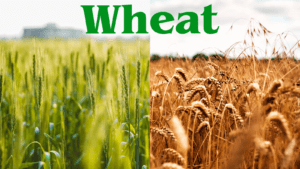The Resilience of Wheat: A Staple Crop’s Enduring Legacy

Wheat, a ubiquitous grain that has nourished humanity for millennia, stands as a testament to the remarkable resilience and adaptability of agricultural science. In this blog post, we will delve into the rich history of wheat cultivation, explore its global significance, and highlight the technological advancements that continue to shape its future. Join us on a journey through time and science as we celebrate this age-old crop.
The Ancient Origins:
Wheat (Triticum aestivum) can trace its roots back over 10,000 years to the fertile crescent of the Middle East. This remarkable grain was among the first crops domesticated by early human societies. Its adaptability to different climates and soil types soon led to its spread across continents, becoming a cornerstone of agriculture in various regions.
Wheat’s Global Significance:
Today, wheat stands as a global staple, feeding billions of people and supporting economies worldwide. Its significance in global agriculture cannot be overstated. Let’s examine its role in various aspects of life:
- Food Security: Wheat provides a substantial portion of the world’s dietary energy and protein. It’s a primary ingredient in staples like bread, pasta, and cereals, making it a critical component of food security for countless communities.
- Economic Impact: Wheat is a significant commodity in international trade. It serves as a source of income for millions of farmers and contributes significantly to the economies of many nations.
- Cultural Importance: Beyond its nutritional value, wheat holds cultural significance in numerous societies. Its cultivation is deeply rooted in traditions and rituals across the globe.
- Biodiversity: The cultivation of different wheat varieties has spurred the development of diverse ecosystems and genetic resources, contributing to biodiversity conservation efforts.
The Science of Wheat Improvement:
Wheat’s continued success can be attributed in large part to advancements in agricultural science and technology. Here are some key areas where innovation has played a pivotal role:
- Crop Breeding: Modern breeding techniques have led to the development of high-yielding wheat varieties with improved disease resistance, drought tolerance, and nutritional content.
- Genomics: The sequencing of the wheat genome has opened up new avenues for crop improvement. Scientists can now pinpoint genes responsible for desired traits and use this knowledge to develop superior varieties more efficiently.
- Precision Agriculture: Technology-driven approaches, such as remote sensing and data analytics, enable farmers to optimize wheat cultivation, conserving resources and maximizing yields.
- Sustainable Practices: With the increasing emphasis on sustainability, wheat farming has adopted eco-friendly practices, reducing the environmental footprint of this vital crop.
The Future of Wheat
As we look ahead, the future of wheat is promising but faces unique challenges. Climate change, evolving pest pressures, and the need for sustainable farming practices will require continued innovation. However, with the dedication of researchers, farmers, and agricultural organizations, we can anticipate a bright future for wheat and the global food supply it sustains.
Innovations Driving Wheat’s Future
While we have discussed the historical significance and modern advancements in wheat cultivation, it’s crucial to delve further into the innovations that are propelling this crop into the future.
1. Genetic Modification:
Genetic modification has become a powerful tool in crop improvement. Scientists are working on genetically engineered wheat varieties that can resist pests, thrive in adverse climates, and even offer improved nutritional content. These innovations not only enhance crop yields but also reduce the need for chemical pesticides and fertilizers, contributing to sustainability.
2. Climate-Resilient Varieties:
Climate change poses a significant threat to wheat production due to increased temperatures and altered precipitation patterns. Researchers are developing wheat varieties that can better withstand these challenges. Heat-tolerant and drought-resistant strains are being created through selective breeding and genetic engineering.
3. Data-Driven Farming:
The digital revolution has reached the fields. Farmers now utilize precision agriculture techniques, harnessing data from sensors, satellites, and drones to optimize planting, irrigation, and harvesting. This data-driven approach not only increases yields but also reduces resource wastage.
4. Sustainable Farming Practices:
Sustainability is a key focus in modern agriculture. Practices such as no-till farming, crop rotation, and organic farming are being integrated into wheat cultivation. These methods promote soil health, reduce erosion, and limit the environmental impact of farming.
5. Nutritional Enhancement:
Addressing malnutrition is another facet of wheat research. Scientists are working on enhancing the nutritional profile of wheat, aiming to fortify it with essential vitamins and minerals, particularly in regions where wheat is a dietary staple.
6. Global Collaboration:
The challenges facing wheat production are global, and solutions require international cooperation. Scientists, farmers, and policymakers worldwide are collaborating to exchange knowledge, share best practices, and develop strategies for sustainable wheat farming.
Sustaining Wheat for Generations to Come
As we navigate the ever-evolving landscape of agriculture, sustaining wheat for generations to come requires a multifaceted approach that encompasses technological innovation, responsible farming practices, and a renewed commitment to global food security.
1. Investing in Research and Development:
Continued investment in agricultural research is paramount. Governments, private companies, and international organizations must allocate resources to support ongoing research into wheat genetics, disease resistance, climate adaptability, and nutritional enhancement. Collaborative efforts between research institutions, universities, and farmers can accelerate progress and lead to breakthroughs that address pressing challenges.
2. Empowering Farmers:
At the heart of wheat production are the farmers who tirelessly cultivate the land. Providing them with access to cutting-edge technologies, training, and resources can empower them to make informed decisions, optimize their yields, and implement sustainable practices. Government incentives, extension services, and farmer cooperatives can play a pivotal role in this endeavor.
3. Promoting Sustainable Practices:
Sustainability must be a guiding principle in wheat cultivation. Implementing regenerative farming techniques, reducing water usage through efficient irrigation systems, and minimizing chemical inputs are crucial steps toward reducing the environmental impact of wheat production. Additionally, encouraging biodiversity through cover cropping and maintaining natural habitats within agricultural landscapes can enhance ecosystem resilience.
4. Enhancing Food Security:
As the global population continues to grow, ensuring food security remains a critical objective. By developing drought-tolerant and disease-resistant wheat varieties, we can mitigate the impact of changing climatic conditions on crop yields. Furthermore, promoting equitable distribution systems and reducing food waste can contribute to a more secure food supply chain.
5. Embracing Digital Agriculture:
The digital era presents unprecedented opportunities for agriculture. Integrating advanced technologies such as artificial intelligence, machine learning, and big data analytics can revolutionize how we monitor crops, predict disease outbreaks, and optimize resource allocation. These innovations can help farmers make informed decisions and enhance overall productivity.
6. Educating and Raising Awareness:
Engaging the public in conversations about the importance of wheat and the challenges it faces is crucial. Education campaigns, workshops, and public forums can foster greater understanding of the complexities of agriculture and encourage support for sustainable farming practices and research initiatives.
The Legacy Continues
Wheat’s legacy is a testament to the resilience of both the crop itself and the ingenuity of humanity. From ancient civilizations to modern societies, wheat has remained an integral part of our journey. As we look ahead, the story of wheat’s future is one of promise and possibility, driven by scientific discovery, collaborative efforts, and a shared commitment to feeding the world sustainably.
In our pursuit of a better tomorrow, let us honor the legacy of wheat by embracing innovation, championing sustainability, and ensuring that the nourishing benefits of this remarkable crop endure for generations to come.
Don’t miss out on updates! Subscribe now to stay informed and empowered!

